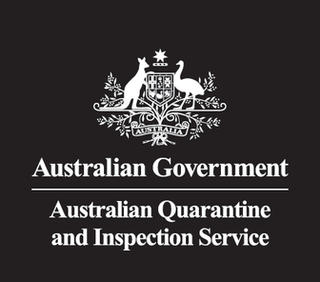Related Research Articles
Biosecurity refers to measures aimed at preventing the introduction and/or spread of harmful organisms to animals and plants in order to minimize the risk of transmission of infectious disease. In agriculture, these measures are aimed at protecting food crops and livestock from pests, invasive species, and other organisms not conducive to the welfare of the human population. The term includes biological threats to people, including those from pandemic diseases and bioterrorism. The definition has sometimes been broadened to embrace other concepts, and it is used for different purposes in different contexts.

The University of Melbourne is a public research university located in Melbourne, Australia. Founded in 1853, it is Australia's second oldest university and the oldest in Victoria. Its main campus is located in Parkville, an inner suburb north of Melbourne's central business district, with several other campuses located across Victoria.

The Australian Quarantine and Inspection Service was the Australian government agency responsible for enforcing Australian quarantine laws, as part of the Department of Agriculture.
The Australian Research Council (ARC) is the primary non-medical research funding agency of the Australian Government, distributing more than A$800 million in grants each year. The Council was established by the Australian Research Council Act 2001, and provides competitive research funding to academics and researchers at Australian universities. Most health and medical research in Australia is funded by the more specialised National Health and Medical Research Council (NHMRC), which operates under a separate budget.

One use of the concept of biocontainment is related to laboratory biosafety and pertains to microbiology laboratories in which the physical containment of pathogenic organisms or agents is required, usually by isolation in environmentally and biologically secure cabinets or rooms, to prevent accidental infection of workers or release into the surrounding community during scientific research.
Centre of excellence or center of excellence may refer to:
The Cawthron Institute is New Zealand's largest independent science organisation, specialising in science that supports the environment and development within primary industries. Cawthron has its main facilities in Nelson. It works with regional councils, government departments, major industries, private companies, and other research organisations throughout New Zealand and around the world. Cawthron employs approximately 300 scientists, laboratory technicians, researchers and specialist staff from 26 countries. It has both chemistry and microbiology labs, and has a major focus on food related testing for food safety and export certification. Cawthron holds IANZ accreditation for a wide range of tests. Its scientists include experts in aquaculture, marine and freshwater resources, food safety and quality, algal technologies, biosecurity and analytical testing.
Mark A. Burgman is an Australian ecologist, Director of the Centre for Environmental Policy and Professor in Risk Analysis & Environmental Policy, Imperial College London and Editor-in-Chief of the journal Conservation Biology. He was Director of the Australian Centre of Excellence for Risk Analysis (ACERA), latterly CEBRA, and Adrienne Clarke Chair of Botany at the University of Melbourne until 2017. He co-leads The SWARM Project at the University of Melbourne.
Andrew or Andy Robinson may refer to:

Crawford School of Public Policy is a research-intensive policy school within the ANU College of Asia and the Pacific at The Australian National University which focuses on Australia and the Asia-Pacific region. The school was named after Sir John Crawford, and its current director is Professor Helen Sullivan.
National biosecurity in Australia is governed and administered by two federal government departments, the Department of Health and the Department of Agriculture, Fisheries and Forestry. The Biosecurity Act 2015 (C'wealth) and related legislation is administered by the two departments and manages biosecurity risks at the national border. The Act aims to manage biosecurity risks to human health, agriculture, native flora and fauna and the environment. It also covers Australia's international rights and obligations, and lists specific diseases which are contagious and capable of causing severe harm to human health. Each state and territory has additional legislation and protocols to cover biosecurity in their jurisdiction (post-border) including the detection of pests and diseases that have breached the national border.
Biosecurity in the United States is governed by the Bureau of Western Hemisphere Affairs, which is part of the US Department of State. It obtains guidance and advice on specific matters relating to biosecurity from various other government agencies.
The Department of Agriculture and Fisheries is a department of the Queensland Government which aims to maximise the economic potential for Queensland's primary industries on a sustainable basis through strategic industrial development. The section known as Biosecurity Queensland is responsible for biosecurity matters within the state.
P-boxes and probability bounds analysis have been used in many applications spanning many disciplines in engineering and environmental science, including:

The Cooperative State Research, Education, and Extension Service (CSREES) was an extension agency within the U.S. Department of Agriculture (USDA), part of the executive branch of the federal government. The 1994 Department Reorganization Act, passed by Congress, created CSREES by combining the former Cooperative State Research Service and the Extension Service into a single agency.
Professor Jane Elith is an ecologist in the School of Botany at the University of Melbourne. She graduated from the School of Agriculture and Forestry at the University of Melbourne in 1977. She specialises in ecological models that focus on spatial analysis and prediction of the habitat of plant and animal species. Following graduation, she was a research assistant and tutor for three years, and then spent the following 12 years raising her children. She returned to the University of Melbourne in 1992 and later commenced a part-time PhD in the School of Botany. She was awarded her PhD in 2002 on 'Predicting the distribution of plants'. Since then, she has been a research fellow in the School of Botany. She is currently an ARC Future Fellow and sits within the Centre of Excellence for Biosecurity Risk Analysis at the University of Melbourne.
The Faculty of Veterinary and Agricultural Sciences (FVAS) is a faculty of the University of Melbourne. The faculty is a medium for undergraduate education and academic research into economically and medically important fields related to agriculture and veterinary science, such as agronomy, biosecurity, environment, food security, food science, parasitology, pest control, veterinary virology, zoonotic diseases, etc.

The Australian Department of Agriculture was an Australian Government department in existence between May 2019 and February 2020, which was responsible for developing and implementing policies and programmes that contribute to strengthening Australia's primary industries, delivering better returns for primary producers at the farm gate, protecting Australia from animal and plant pests and diseases, and improving the health of Australia's rivers and freshwater ecosystems.

Fiona Fidler is an Australian professor and lecturer with interests in meta-research, reproducibility, open science, reasoning and decision making and statistical practice. She has held research positions at several universities and across disciplines in conjunction with Australian Research Council (ARC) Centres of Excellence.
References
- 1 2 3 4 5 Arndt, Edith; Robinson, Andrew; Baumgartner, John; Burgman, Mark. "Overview of ACERA/CEBRA Projects: a summary of project outputs and outcomes". Overview of ACERA/CEBRA Projects. Retrieved 9 April 2020.
- 1 2 3 4 5 6 "Our History : CEBRA". CEBRA. 7 February 2020. Retrieved 9 April 2020.
- ↑ CEBRA. "ANNUAL REPORT2018–2019" (PDF). University of Melbourne. School of Biosciences. p. 55. Retrieved 9 April 2020.
- ↑ "Chief Investigators". CEBRA. 12 December 2019. Retrieved 9 April 2020.